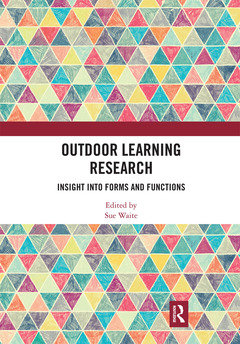Outdoor Learning Research Insight into forms and functions

The term ?outdoor learning? covers many forms of practice outside the classroom, including Forest School and outdoor play. Outdoor learning has been rapidly growing as a topic of interest for educators and parents over the last ten years, and research published in this field is also increasing. Despite the fact that we are inextricably part of the natural world, there is concern that contemporary children have become disconnected from nature and that their opportunities to access natural environments are declining. Given compelling evidence that time spent in natural places has multiple benefits for human health and wellbeing and pro-environmental behaviour (Bourn et al., 2016), there is an impetus to find ways to increase children?s exposure to and attachment to nature through their education.
The chapters in this book were originally peer-reviewed articles published in Education 3?13: International Journal of Primary, Elementary and Early Years Education. They are amongst the most popular in the journal, reflecting the demand for more evidence of outcomes and high-quality information about how best to implement outdoor learning for children in this age group. The authors report qualitative and quantitative studies and consider implications of the findings for children and their development, and for the integration (or not) of natural environment contexts within school practices. Gathering this body of evidence together in a single volume enables important messages about outdoor learning?s various purposes, processes and outcomes to be more readily accessed by practitioners, policy makers and researchers.
Preface Introduction: Outdoor Learning: exploring possibilities for educational enrichment1. Teaching and learning outside the classroom: personal values, alternative pedagogies and standards2. ‘Memories are made of this’: some reflections on outdoor learning and recallPart I: International perspectives about outdoor learning 3. Towards an understanding of udeskole: education outside the classroom in a Danish context4. ‘Let's go outside’: Icelandic teachers' views of using the outdoors5. The outdoor environment as a site for children's participation, meaning-making and democratic learning: examples from Norwegian kindergartens6. The ‘outdoor school’ as a school improvement process: empirical results from the perspective of teachers in Germany7. The reconceptualisation of outdoor education in the primary school classroom in Aotearoa New Zealand: how might we do it? Part II: Embedding outdoor learning in education for children aged 3-13 8. Everyday teaching and outdoor learning: developing an integrated approach to support school-based provision9. Falling into LINE: school strategies for overcoming challenges associated with learning in natural environments (LINE)10. Improving and encouraging teacher confidence in out-of-classroom learning: the impact of the Hampshire Trailblazer project on 3–13 curriculum practitioners11. Assessing learning in the early years’ outdoor classroom: examining challenges in practice12. Diverse aims, challenges and opportunities for assessing outdoor learning: a critical examination of three cases from practicePart III: Purposes and pedagogies of outdoor learning 13. Can the integration of field and classroom-based learning enhance writing? The life on our shore case study14. Outdoor mathematics trails: an evaluation of one training partnership15. School gardens: teaching and learning outside the front door16. Learning outdoors: the Forest School approach17. The nature of learning at forest school: practitioners' perspectives18. Fostering children’s relationship with nature: exploring the potential of Forest School19. Footprints in the woods: ‘tracking’ a nursery child through a Forest School session20. Forest School in an inner city? Making the impossible possible21. Does engagement in Forest School influence perceptions of risk, held by children, their parents, and their school staff?22. Encounters with Forest School and Foucault: a risky business?
Sue Waite, formerly Reader in Outdoor Learning at Plymouth University, UK, has a long history of research and publications about play, learning and wellbeing in natural environments, including two research council awards and a large project on curriculum-based outdoor learning, Natural Connections. Her edited book, Children Learning Outside the Classroom: From Birth to Eleven (2017), is in its second edition. She currently holds honorary posts at Plymouth Institute of Education and Jönköping University, Sweden.
Date de parution : 09-2020
17.4x24.6 cm
Date de parution : 12-2018
17.4x24.6 cm
Thème d’Outdoor Learning Research :
Mots-clés :
Forest School; Outdoor Learning Provision; Education 3-13; Outdoor Learning Practice; forest schools; Outdoor Learning; pedagogy; Forest School Practitioners; nature play; Forest School Association; experiential education; Forest School Ethos; learning outside the classroom; Children’s Outdoor Experiences; Wo; Follow; Outdoor Education; Forest School Activities; Forest School Leaders; Personal Development; Forest School Approach; Forest School Sessions; Outdoor Learning Activities; Professional Development; Outdoor Environment; Outdoor Context; Classroom Manifesto; Outdoor School; Outdoor Classroom; Foundation Phase; Nature Education



